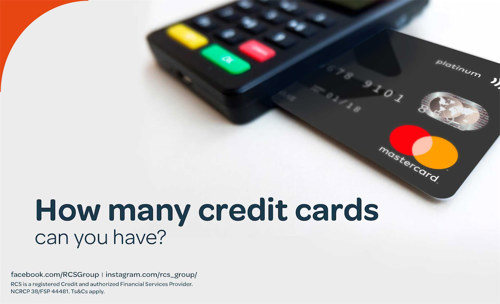How many credit cards can you have?
11 AUGUST 2023
Understanding the difference between how many credit cards you can have, versus how many cards you should have is important. This will give you more insight into money management and using the right tools to reach your financial vision.
How credit cards work
Your credit card functions as a loan from your creditor that you use to make purchases. When opening up a credit account, you agree to pay back the amount borrowed plus interest and any other applicable fees. How you use your card and how responsible you are with making payments on time has a direct impact on your credit score.
Different credit card types cater to different situations. These are;
- Low-APR credit cards: These are the best option for people who need a credit card for a long while as a consistent line of credit. These types of cards often don’t have any other incentives besides a lower borrowing cost.
- 0% purchase cards: Credit cards with a 0% purchase rate will charge you no interest on your purchases. They can function as an instant loan, which can make it very tempting to overspend. Keep in mind that once this no-interest period is over, what you are charged could be more than the average interest rate.
- 0% balance transfer cards: These types of credit cards are ideal if you aim to move existing debt. They allow you to transfer debt from another card onto this card, giving you a delay in paying interest until the grace period ends on this new card.
- Reward and cashback cards: Incentive-based cards have high APRs despite the many benefits they might offer. Only take one of these out if you’re certain you can meet the high costs and pay on time every month.
- Credit building cards: If you are trying to build up your credit score, then these cards are for you. They have high APRs and low credit limits, encouraging you to pay balances off in full and on time. This in turn builds your credit history, showing that you can use credit properly.
How many credit cards CAN I have?
There is no limit, by law, as to how many credit cards you can have as it depends on the cardholder’s needs/wants and credit card issuers. As there are different types of credit cards that have various purposes, having multiple cards could be beneficial. Although, this doesn’t mean that you need a credit card of each type. Assess why you need a credit card and not how many credit cards you need. And how you’ll be able to manage them all.
How many credit cards SHOULD I have?
Whether you should have 2 credit cards or 6 is determined by your individual needs and your ability to handle the extra credit responsibility. It is, however, a good idea to have at least 2 or 3 cards that cover a few key needs, as credit cards can aid in boosting your credit score. For example, one or two for emergencies or times of need and another to support your spending with cashback rewards or points.
If you have existing debt on a credit card, it would also be useful to take out a 0% balance card to give yourself a little time before having to pay interest again. Take into account your financial goals and where you are right now and what tools you will need to reach those goals. This will help you determine how many credit cards you should have.
Pros of owning multiple credit cards
Besides the benefits mentioned above of having multiple credit cards, these are a few more advantages;
- A separate card for online shopping to keep track of spending and identity theft or fraud.
- A backup card if one of your major credit cards is lost or stolen.
- A widely accepted backup card for travelling overseas.
- Use rewards cards smartly, for example, having a store card at your favorite store that you spend at often or a travel rewards card if you start planning your next vacation.
Cons of owning multiple credit cards
The main disadvantage of having too many credit cards is the impact on your credit score. You need to be 100% certain that opening another credit account will not impact your credit score. This means that you have the financial capability to pay back balances in full and on time. Too many credit cards can also hurt your credit score in these ways;
- Not attending to existing debt,
- Your debt-to-income ratio is already more than 30%,
- You already have opened too many credit card at the same time,
- Your credit accounts only consist of credit cards.
How many are too many credit cards?
The answer to this question differs from person to person. If you’re able to use credit responsibly and smartly, then too many credit cards are dependent on your income, needs, and plans for the future.
What is key to remember, even if you are responsible, is to avoid opening multiple cards in a short space of time. This can potentially lower your credit score. Avoid opening up a lot of credit cards just because you can.
Tips on managing multiple credit cards
- Avoid using more than 30% of your available credit on any of your cards, this will help keep your credit utilisation ratio low.
- Know your credit card account limits, benefits, and payment due dates.
- Always pay on time. Set up an automatic reminder or schedule.
- Keep your balances as low as possible by paying in full before your due dates.
- Monitor your spending and avoid using credit cards when not needed.
Should I cancel any existing cards?
Remember to keep stock of how many credit card accounts you have open and what type of credit card they are. For example, if you’ve taken out a card with a 0% interest period, then it should be closed after this period is over. If not, interest will start to pile up and will only add unnecessary debt.
Keeping certain cards open will only benefit you. Your most reliable card with a low APR should be kept open for a long time so that you can use credit responsibly and build a credit history. As the length of your credit history is taken into account when determining your credit score, keep older credit cards open to increase your average age of credit. Keep one or two reliable credit cards open as they also increase the amount of available credit you have, which has a positive impact on your debt-to-credit ratio and credit utilization ratio if you have outstanding balances.
Credit cards are extremely useful tools to help you reach your goals. All you need to do is use them responsibly and wisely to your advantage.



